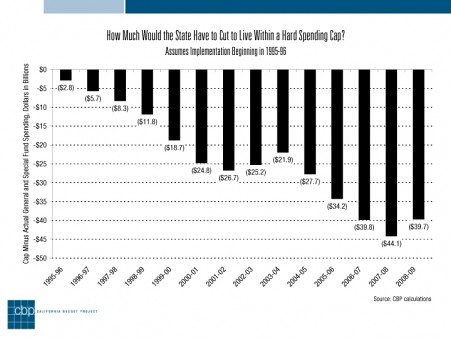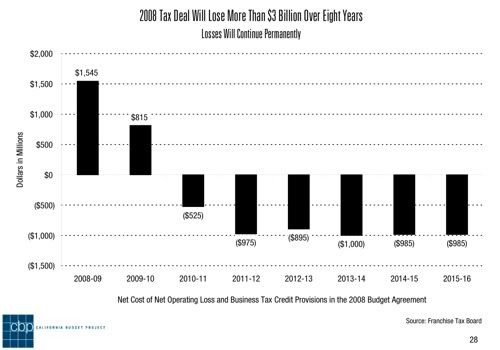Although a budget deal has been rumored for a few days now it has yet to actually materialize. Still, the Sac Bee reports on the outlines of a widely rumored agreement (h/t to surfk9):
Multiple legislative sources said Tuesday that it would raise revenues temporarily by these means:
— Increasing the state’s sales tax by 1 cent on the dollar.
— Increasing gasoline taxes by 12 cents per gallon.
— Raising the state’s vehicle license fee from the current 0.65 percent of a vehicle’s value to 1.15 percent, with 1 percent going to the general fund and local law enforcement getting 0.15 percent.
— Increasing the personal income tax across the board, either by assessing a surcharge on tax liability or increasing the tax rate.
The sales tax, personal income tax and vehicle license fee components would be in effect for either two years or five years, depending upon the fate of a ballot measure to restrict spending.
If voters approve the spending limit, the three revenue-raising components would be in effect for five years. If they reject the measure, the revenue would die after two years.
It was not clear Tuesday whether the proposed gasoline tax increase also would be tied to the ballot measure or how long it would remain in effect.
It’s worth noting that this proposal fits the Republicans’ lawless nature. It’s outright extortion – vote for our spending cap or the tax hikes die – and that ballot measure would likely violate the single-subject rule. Republicans are consistent in one thing – they know the public hates them and hates their ideas, so the only way they can impose their far-right ideology on the state is at gunpoint. This proposal shows that the only difference between the Mafia and the California Republican Party is Sicilian accents.
Democrats ought to have been more vocal about the Republicans’ tactics and refused to go along with them (though there’s still time to ask Jerry Brown to investigate Republican lawlessness, and even John Garamendi joined the Facebook group). It’s not clear whether the non-budget items the Republicans illegally demanded are part of this proposal or not.
What the Republicans are trying to pull here is a damned if you do, damned if you don’t move. If we kill their catastrophically bad spending cap, then we return the state to budget crisis by killing the taxes. But if we accept the cap, we advance their Hooverite, aristocratic agenda.
I wonder if that’s actually how it would work out though. I would enthusiastically campaign against the spending cap ballot measure and I doubt that it would be so difficult to get 51% of Californians to vote no – especially once they learn that tax hikes go away if they vote no. We would then have more time to make our case to voters for revenues and government spending. We’d have more time to target and ideally defeat Republicans in November 2010, taking us to 2/3. And hell, if we’re really lucky the economy might recover enough to where the budget isn’t so bad and we’re not saddled with a spending cap holding us back.
I have to believe that the Republicans are at the end of the line on all this. Obama’s successful framing of the federal stimulus will soon impact California politics as voters realize that mass layoffs of government workers, including teachers, is a monumentally stupid idea and that government spending is good and good for you. Anger at Republican obstruction in DC can be easily translated into anger at obstruction in Sacramento.
In short, Democrats have no reason to feel pressured to accept a bad deal. They just need to hold their ground and explain to the public what is really going on. The public is fed up with Republican lawlessness, whether that manifests itself in this deal or in the killing of their horrific spending cap.


